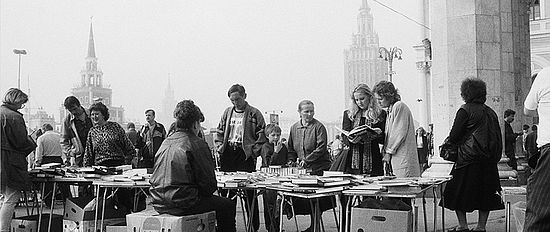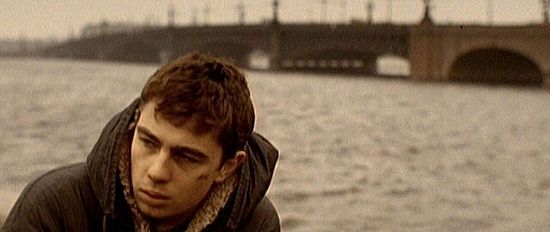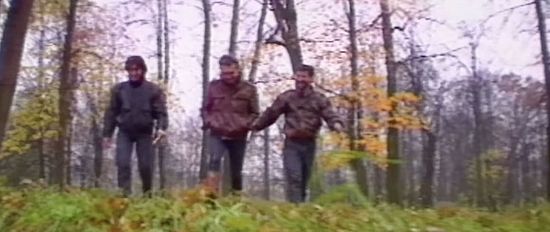Imagining the 90s
The First Post-Soviet Decade and its Narratives in Literature and Culture
International conference, January 20-22th 2022, ONLINE
30 years after the dissolution of the Soviet Union, the time has come to historicize the 1990s and their conceptualizations. Rarely has there been a period marked by such contradictory and multi-coded framings as the first post-Soviet decade: Viewed both as a time of troubles (”лихие 90-е”) as well as a time of absolute freedom, as a period of global disorientation and crisis as well as one of new hopes and opportunities, the post-Soviet 1990s form a perfect example of what Jury Lotman called a “взрыв” (“explosion”). While many studies have examined the political, social and economic transformations in the post-Soviet realm, little attention has been paid to the images that this crucial decade generated in the arts. This is all the more surprising given that literature, film, theatre, music and other artistic manifestations are likely to provide the most complex and multi- layered insights into this time and its diverse representations. In this conference, we want to investigate the 90s, on the one hand, as a time of wide-ranging artistic transformations and, on the other hand, as a topos created in (later) narratives and artistic imaginations.
Imagining in the 90s: With respect to the arts, it is assumed that with the end of the Soviet paradigm, the dissolution of the norms of socialist realism caused both formal disorientation and liberation at once. At the same time, the postmodern crisis of “grand narratives” (Lyotard) as well as the commercialization and privatization of cultural institutions had a formative impact on the artistic production. Furthermore, after 1991, many artistic fields eventually assumed new systemic functions (e.g., literature lost its role as a leading discourse, “literaturotsentrichnost” comes to an end). Combined with an intensified reception of Western cultural trends, the restitution of previously censored Soviet art, the publication of emigrant authors and the open discussion of discourses formally attributed to the Soviet ‘underground’, all of this resulted in a radical pluralization of the cultural and literary fields. We want to ask: How can the artistic imaginations and investigations of this period be described and conceptualized? Are there still typical attributes to characterize the 90s?
Imagining the 90s: Many scholars hypothesize that by the end of the first post-Soviet decade the 90s more and more became a topic in arts, fiction, as well as in political and social discourses. Still, research on the diverse and contradictory imagery around them is scarce. When and how exactly did the 90s enter post- Soviet literature and culture as a topos in cultural and historical imagination, as an object of artistic reflection? How do the images and narratives employed to represent this time differ in artistic works from the 90s compared to works from the 2000s and later? And: How did and does the artistic and cultural imagination take part in the construction of political narratives and identities or potentially form counter-narratives to the latter?
The international conference “Imagining the 90s” aims to bring together experts from different disciplines (e.g., literary, film and theatre studies, history) to develop studies within the framework of these two perspectives mentioned above.
Particularly, we invite you to reflect upon the following issues:
Narratives of Crisis: What role do discourses and narratives of crisis, often attributed to the “лихие 90- е”, play in the cultural and artistic fields? Do discourses of crisis produce specific narrative and semiotic devices that enable us to identify particular ‘crisis forms’ of, for example, central narrative categories like eventfulness and experientiality? In what ways do artistic and cultural images reflect upon the potential continuity of crisis discourses, dissolutions and declines of cultural and ideological structures, how they started to shape cultural memory already during the Perestroika?
New subjectivities and authenticities: Amongst the new or altered artistic devices and trends that emerged in / since the first post-Soviet decade, new forms of subjectivity and authenticity seem to have been especially formative in literature, theatre and other arts. How have they shaped the images of this period? What new forms of Gender subjectivities emerged in the post-Soviet space, reflecting changing role models? How are we to contextualize the rise of documentarism and other authenticity claims in literature and the performative arts since the 2000s, and what framings of the 90s and the post-Soviet transition do they provide?
Space and time: With the collapse of the socialist countries, the cultural space of the Soviet Union ceased to exist as an imagined temporal and spatial entity. New imaginaries of national and transnational spaces, histories and futures emerged. How do literary texts and other works of art from different regions engage with the collapse of cultural space and time? How do artists reflect the transition from the imperial multi-national Soviet space towards local, national, but – with the end of the bipolar world – also global spaces? What artistic strategies are employed for the (re)imagination of cultural spaces and the (re)construction of (anti-)utopian presents or futures? How can we contextualize such diverse conceptualizations of cultural and temporal spaces as empty, as overloaded with (meaningless) cultural codes, as a space of (hidden) trauma or as a place of nostalgic longing?
Conference Program
The conference will be held online. Conference languages are English and Russian. The results of the conference are planned to be published in the form of an edited book. Next to presentations, we will hold a couple of roundtables to bring different scholars in a dialogue, as well as to integrate the competences, perspectives and methods of artists and writers. You can find the conference program here.
For the zoom link, please contact: anna.hodel@unibas.ch oder gunnar.lenz@unibas.ch
Further Information and Documents
Confirmed Expert Speakers
- Prof. Dr. Helena Goscilo (Ohio)
- Dr. Natalia Ivanova (Moscow)
- Dr. Boris Noordenbos (Amsterdam)
- Dr. Bradley Gorski (Washington)
Confirmed Participants of Round Tables
- Viktoria Belopolskaya (film programmer, Moscow)
- Michail Durnenkov (playwright, Moscow)
- Viktor Kosakovsky (documentary filmmaker, St. Petersburg/Berlin)
- Mark Lipovetsky (literary scholar and critic, New York)
- Natalia Ivanova (literary critic and journalist, Moscow)
- Olga Muchina (playwright, Moscow)
- Pavel Rudnev (theatre critic and historian, Moscow)
- Barbara Wurm (lecturer and film programmer, Berlin)
Organizers
Slavic Studies, University of Basel:
- Prof. Dr. Thomas Grob
- Dr. Anna Hodel
- Dr. des. Gunnar Lenz
- Mag. Maria Chevrekouko
Comparative Literature Studies, University of Nizhny Novgorod:
- Prof. Dr. Svetlana Averkina
Quick Links



